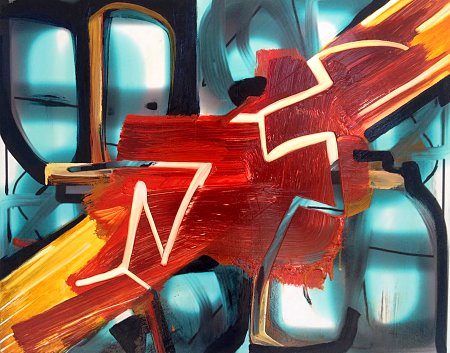
Bread and Peppermint Oil
“Probably, I reckon.” He couldn’t remember. The smell of the bread was making his stomach growl, but he felt reluctant to put out his hands to take it, unwilling to put down the broken crayon or raise his hands from his lap; he felt an uneasy hollowness in his gut, the kind you felt driving down a steep hill.
Adams had picked up his menu, and he pushed Ray’s toward him. “Go on, start looking,” he said. “It’s on me.” At that, Ray felt his lip start to curl, and something stung the back of his throat and nostrils. Then Adams added, “Unless you ain’t hungry.”
“I got to take a piss,” said Ray. With a heavy sigh, Adams twisted round in his seat, squinting for the restroom. Just behind their table, which was closest to the rear of the restaurant, a “Restroom” sign pointed down a little hallway. Ray watched Adams thinking it over.
At last Adams turned back to the table. “All right,” he said, setting his menu down. He followed Ray down the hallway and saw that it was a single-stall. “You go on,” he said, to Ray’s surprise. “Just come on back when you’re finished. Don’t take too long,” he added, pushing a note of authority into his voice.
Ray shut the door behind him and pressed his ear against it. He heard Adams’ footsteps retreat down the hallway. He couldn’t believe it. Adams was an experienced prison guard—this apparent lapse in protocol was either a mental slip or a strong sign of his hunger.
Ray hated the clink of his chains against the white porcelain toilet. Again he felt the surge of hatefulness, the urge to piss on the floor, into the sink, to spray the wallpaper or scatter shreds of toilet paper everywhere. But he didn’t. He washed his hands, scrubbing at his stubs of fingernails.
If he left the bathroom quietly, he could run for the door. Even better, he could run through the kitchen—there was an entrance with the door propped open in the little hallway that led to the bathrooms. He would be barely visible from the dining area. He could push past an oncoming busboy with his shoulder, shove past the sinks with both hands braced. Waitresses and line cooks would yell and dishes would crash to the floor. Someone would get scalded with hot water. He would skin the crown of his head on an unexpectedly low doorway and kick out the back door near the dumpsters. When Adams heard the hullaballoo he would leap up from the table, hand flying to his firearm, cursing and scandalizing the old ladies in the next booth. The basket of steaming rolls would fly to the floor and scatter on the carpet. Everyone would be confused, and then frightened. Hearts would race in fear and alarm. Adams would come flying out the door, perhaps order him to halt. Perhaps fire. A car window would shatter. Tires would screech. An SUV would slam into a lightpost. He would stumble and fall in the street. Oncoming traffic would scream, swerve, slam.
Ray let the bathroom door swing shut behind him and leaned for a moment against the wall, savoring the dark anonymity, the last moments of unseen solitude. Through the doorway to the kitchen he heard the buzz of a boxfan. Three large black waitresses stood with blouses partially unbuttoned, slowly spreading peppermint oil on gleaming dark skin, eyes wilted shut in the heat, humming their words softly in toneless murmurs that knew words didn’t matter, well if’n he did, I don’t know, mm-hm, I reckon he did but I don’t know.
He walked back to his seat, sat down, dried his damp hands on his napkin, chains clinking. Adams pushed the basket toward him. “You make up your mind yet?”
“I reckon,” said Ray, taking a roll. The bread was so hot it burned his lips.
